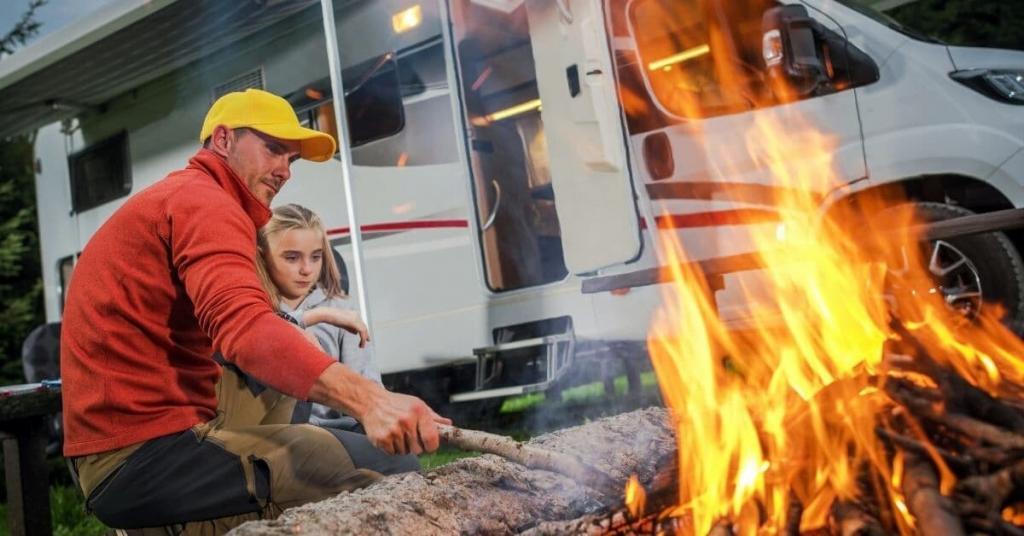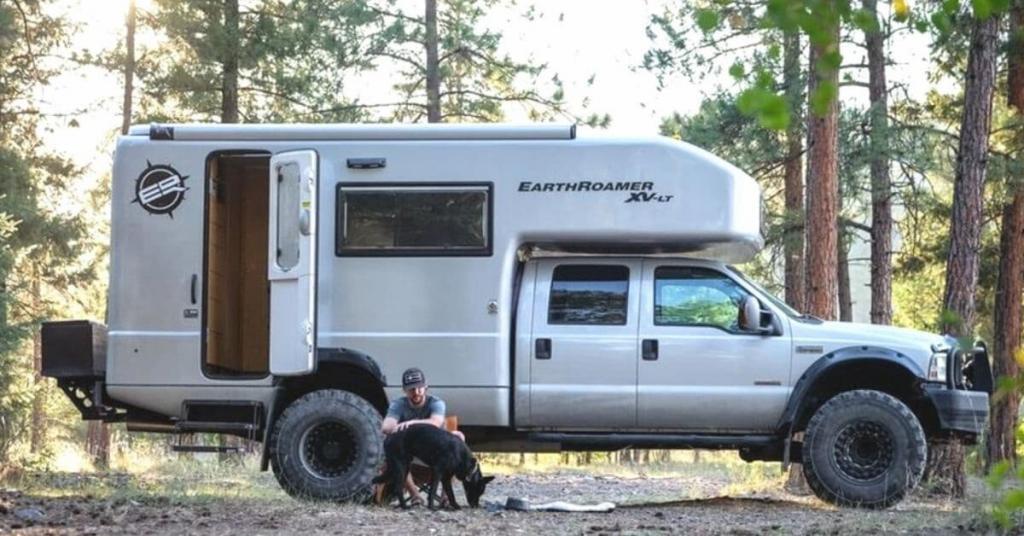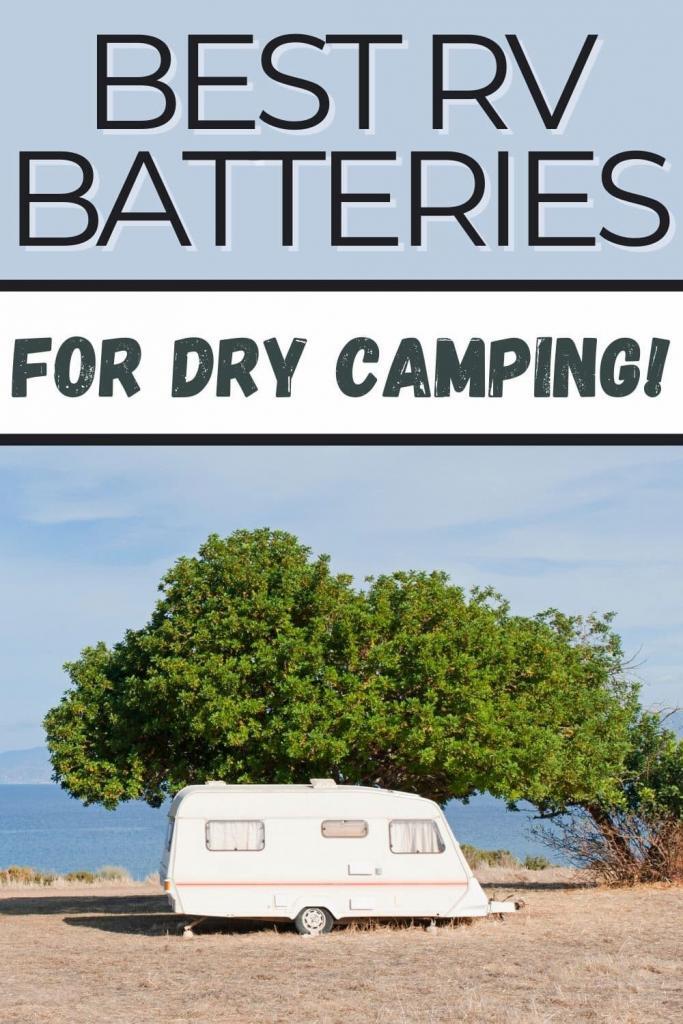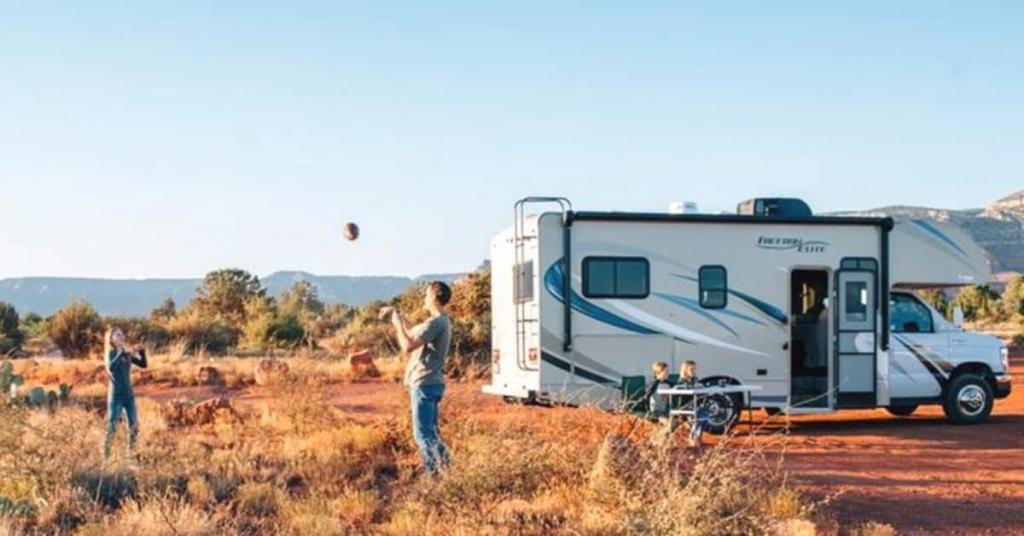A reliable battery is essential for any successful boondocking adventure. They enable you to camp anywhere for extended periods without relying on electric hookups.
So, if you’re looking for the best RV battery for dry camping you’ve come to the right place!
This post may contain affiliate links, which means I’ll receive a commission if you purchase through my links, at no extra cost to you. Please read full disclosure for more information.
What Are The Best RV Batteries For Dry Camping?
For many RVers, camping without power, water, and sewer connections, (also known as boondocking or free camping), is the gateway to a truly authentic camping experience.
It allows you to escape everyday distractions, be closer to nature, appreciate the beauty of the outdoors, and remain self-reliant in the wilderness.
But, in order to enjoy this type of RV camping, it will be necessary to do a little research on your personal power needs and the best RV battery types for your situation.
Investing in a good boondocking battery system will allow you to keep all of your RV’s essential systems running for days at a time, so you can have a great trip!

Now, we know that finding the perfect battery for your situation can be overwhelming, especially if you’re an RV boondocking beginner.
But don’t worry, we’ve done some research and have found the best RV batteries for dry camping
We will also go through a few basic things you need to know about picking the right battery for your motorhome or travel trailer.
So take a look and see if the deep cycle batteries below are best for your off-grid camping needs.
Ok, on to those batteries!
Battle Born LiFePO4 Deep Cycle Battery

Volts: 12 Volts
Battery Cell: Lithium-Ion
Weight: 29 lbs
Capacity: 100 Ah
Cycles: 3000 to 5000 cycles
Warranty: 10 Years
The Battle Born LiFePO4 is considered the best RV battery for boondocking and dry camping. The manufacturer has a strong track record of developing powerful lithium-ion batteries.
These batteries charge fast and efficiently, are lightweight, and come with a 10-year warranty.
The price tag may seem a little high, but it is worth it if you consider the long service life.
The Battle Born is fitted with a battery management system that regulates power and protects the cells from issues that cause battery failure.
Another selling point is that the battery is made using 100% safe, non-toxic renewable energy!
Renogy 12V 100Ah Rechargeable Deep Cycle Pure Gel Battery

Volts: 12 volts
Battery Cell: Pure Gel
Weight: 67 lbs
Capacity: 100Ah
Cycles: 1100 cycles with 50% DoD
Warranty: No Warranty
The Renogy Pure Gel Battery is a reliable deep cycle battery that can withstand the rigors of off-grid environments.
It features a triplex sealed construction that prevents leakage and spills.
In addition to being temperature-resistant, these pure gel batteries are also durable, lasting up to 10 years or more.
This battery boasts a PE compound separator construction that ensures electrolytes are evenly distributed throughout its interior.
Besides that, it has a really low discharge rate, and these sealed batteries are equipped with explosion-proof security valves.
ExpertPower 12V 100Ah LiFePO4 Deep Cycle Rechargeable Battery

Volts: 12 Volts
Battery Cell: Lithium-Ion
Weight: 22.6 lbs
Capacity: 100Ah
Cycles: 7000 cycles with 50% DoD
Warranty: 1 Year
If you’re looking for a budget-friendly lithium RV battery suitable for dry camping, the ExpertPower 12V 100Ah LiFePO4 Deep Cycle Rechargeable Battery is an excellent choice.
One of its biggest benefits is the long service life.
These lithium-ion batteries can last an entire decade and tolerate multiple discharge and recharge cycles a day.
The battery is safety certified, and features a battery management system to protect against short-circuiting, overheating, overloading, deep discharging, and overcharging.
In addition, the battery’s discharge rate is quite low.
Although it’s affordable compared to other lithium-ion batteries, it is more expensive than conventional AGM batteries.
Optima BlueTop Starting and Deep Cycle Battery

Volts: 12 Volts
Battery Cell: AGM
Weight: 43.5 lbs
Capacity: 55Ah
Cycles: 25 Amps with RC at 120 Mins
Warranty: 3 Years
The Optima 8016-103 Deep Cycle Battery is a rugged and versatile dual-purpose battery that can be used as both a starting battery for small fishing boats and a house battery for RVs.
It features a unique SpiralCell design that gives it a better and more reliable performance than the competition.
Optima batteries are vibration-resistant, maintenance-free, and can be mounted in any position due to their spill-proof construction.
At 55Ah, it clearly has far less battery capacity than the other batteries.
Nevertheless, the manufacturer has a long-standing reputation for a durable, quality product that you can depend on, even in brutal temperatures.
VMAXTANKS 6V AGM Battery

Volts: 6 Volts
BatteryCell: AGM
Weight: 72 lbs
Capacity: 225Ah
Cycles: 25Amps with RC at 500 Mins
Warranty: 1 Year
If you need a long-lasting battery that will provide you the energy your motorhome or travel trailer needs when camping in the wild, check out VMAXTANKS 6 volts AGM battery.
It’s an outstanding product that lasts 8 to 10 years without compromising reliability.
Besides the long service life, it’s leak-resistant, maintenance-free, and mountable at any angle.
This deep cycle battery has a meager discharge rate, allowing you to power multiple appliances without losing energy.
It excels as solar power or wind power battery.
Despite the great features, the battery’s extreme weight can be an issue for some.
Plus, the 6 volts may not be sufficient for dry camping. So, you may need two of these RV batteries to have the power you need.
Weize 12V 100AH Deep Cycle AGM Battery

Volts: 12 Volts
Battery Cell: Sealed Lead Acid AGM
Weight: 57 lbs
Capacity: 100Ah
Warranty: 1 Year
Yet another excellent boondocking RV battery that’s economical is the Weize Deep Cycle Battery.
It features a heavy-duty calcium-alloy grid for high-quality performance and service life.
It’s spill-proof, maintenance-free, compact, and lightweight.
The Weize battery has a high energy density, allowing it to deliver consistent power output for a prolonged period.
Its slow self-discharge rate gives it a longer shelf life, making it ideal for seasonal applications.
You’ll also love the fact that it isn’t sensitive to full depletion.
What is an RV Battery, and How Does It Work?
So, if you’ve decided you need a deep-cycle battery but are still not quite sure which is the best RV battery for boondocking, maybe it would be a good idea to go over what a battery is exactly and how they work so you can choose the best battery system for your specific needs.
Chasis Or Starting Battery
Recreational vehicles come with two separate batteries onboard.
One is called the chassis battery or starting battery. It’s used to start the vehicle engine when you hit the ignition.
This battery is designed to provide a large amount of starting current in short bursts. It’s rated in Cold Cranking Amps—the ability to start an engine in cold temperatures.
Deep Cycle RV Battery (RV House Battery)
The second battery is a deep cycle battery, commonly referred to as the RV house battery.
While both types of batteries are important for RV owners, the deep cycle batteries are what we will really focus on in this article.
A deep cycle battery serves as the power source for all other energy-related applications.
This type of battery provides a steady amount of current over a long period, allowing you to run the lights, water pump, small appliances, TV, phone charger, and even a laptop.
House batteries are most often rated in Amp Hours (AH). AH is basically, how many amps the battery can deliver for how many hours before it runs out of battery power.
If you need a longer-lasting power supply or plan to power multiple appliances without access to electricity for days, you’ll need multiple batteries (also known as a battery bank) on board and set them up in series to allow simultaneous use of different appliances and systems.
Types of RV Batteries
Not all deep cycle RV batteries are made equal, and they all function differently.
House batteries generally come in 12-volt and 6-volt designs but there’s much more to battery consideration than just the battery voltage.
Here’s a brief breakdown of the various types of house battery technologies available for RVers.
Lead-Acid Batteries
A lead-acid battery is the most common type of RV battery.
This type of deep cycle RV battery contains lead plates immersed in an electrolyte solution made up of sulfuric acid and water.
A deep-cycling battery offers a longer service life, will discharge deeper, and store more power compared to standard lead-acid batteries.
However, they require the addition of distilled water, should only be discharged to about 50% to avoid damage, and are incredibly heavy.
Lithium-Ion Batteries
Lithium-ion batteries are the gold standard for RV dry camping batteries.
They have a higher energy density, are lighter, perform well in all temperatures, and require no maintenance.
Moreover, a lithium battery can charge faster, is fully discharged without getting damaged, and doesn’t emit hydrogen gas when charging.
Flooded Lead-Acid Batteries
Lead-acid batteries are typically the least expensive RV batteries and can be stored for long periods without losing their charge.
The downside is they require venting because they off-gas hydrogen during charging.
On top of that, they need routine maintenance, shouldn’t be discharged below 50% capacity, and are very heavy.
Flooded batteries can also be unreliable in extreme temperatures.
AGM Batteries
AGM (absorbent glass mat) batteries are sealed lead-acid batteries.
The liquid inside the battery is absorbed by glass mats, so it can’t spill out. This type of battery requires no maintenance, is temperature-resistant, can handle vibration, and unlike lead-acid batteries- don’t release hydrogen.
Another bonus is that AGM batteries are less expensive than lithium batteries.
But, keep in mind, these RV batteries have a 50% limit on their useable power.
Gel Batteries
Gel Cell batteries are leak-proof batteries filled with a thick gel that immobilizes the acid, ensuring it doesn’t spill when shaken or tipped.
Like lithium and AGM batteries, gel batteries require no maintenance, are rugged, and operate in hot and cold temperatures.
The downside is that they’re fairly expensive, tend to take a long time to charge, and have a 50% limit on their useable power.
Frequently Asked Questions About RV Batteries For Dry Camping

Still have a few questions about which RV batteries are best for boondocking?
Here are some frequently asked questions and our best answers!
What Exactly Is Dry Camping?
Just in case you are brand new to the idea of boondocking or dry camping, or if you have heard of it but still aren’t sure of what it is exactly, let me explain…..
Dry camping means staying in a place without power, water, and sewer.
That means your RV will have to be fully self-contained and able to operate without access to those amenities.
This form of camping is also commonly known as boondocking, free camping, dispersed camping, or wilderness camping.
Boondocking most often occurs outside of a traditional RV park or campground.
Popular dry camping areas include National Forests and Grasslands, Bureau of Land Management lands, state lands, city, county, and community parks, Walmart parking lots, and private properties.
Many RVers often describe off-grid dry camping as the best way to camp because of the seclusion, peace, and serenity it offers.
What Is The Best Battery Setup For An RV?
For many RVers, lithium-ion batteries are the best when it comes to providing power to a rig that is dry camping.
These batteries supply more power, charge quickly, and can be fully drained without damage.
But, they’re pretty pricy, so if you are looking for the best RV battery for dry camping and a lithium-ion battery isn’t in the budget just yet, the next best choice might be an AGM.
What Qualities Do I Look For In An RV Battery For Dry Camping?
A lot goes into shopping for battery types and picking an RV battery for boondocking.
But ideally, you’ll want a 12 volts house battery that can withstand extreme temperatures, store enough power for your needs, withstand bumps and rough terrain, has a low discharge rate, and last as long as possible before needing replacement.
How Long Can You Boondock On A Battery?
Under normal use, most RV batteries last 2 to 3 days.
That is if you’re only using it to power lights, water pumps, phones, and other small electrical systems.
Your battery may not last long enough if it’s inefficient or if you’re powering heavy appliances like an RV air conditioner.
How Do I Save My RV Battery Life?
Dry campers conserve their RV’s battery by:
- running the water pump less frequently
- investing in led lights
- switching off lights as much as possible
- performing most tasks in daytime
- using natural light
- running the furnace sparingly
Alternatively, you can upgrade to a battery with a bigger capacity, add extra deep cycle batteries, or consider investing in a solar charger or solar panels as well.
How Do I Charge My Boondocking RV Battery?
There are two main options when it comes to charging your dry camping RV battery: solar panels and generators.
Although the initial cost is high, solar power is the most convenient option as you harness the sun’s energy to charge the battery quietly.
Generators are another good option, although they can be noisy, use a lot of fuel, and require frequent maintenance.
There are pros and cons to both options, but if you have the budget and the space, having both solar power and a generator can be very beneficial, especially for full-time boondockers.
Final Thoughts On The Best RV Battery For Boondocking
RV batteries can make or break your remote camping excursion.
Before you start shopping, take your time to explore the options available and assess your requirements.
Consider what systems you need to power, your budget, how often you plan to camp, the conditions of the places you plan to boondock, as well as the weight you’re willing to haul.
I hope this guide will help you find information about the different battery types and how to choose the best RV battery setup for your needs.
Wishing you many happy boondocking adventures!
Related Articles
- RV Boondocking For Beginners: Everything You Need To Know Before You Go
- Boondocking Etiquette: General Guidelines And Helpful Tips!
- 20 Boondocking Safety Tips + Must-Have Supplies: Essential Info You Need Before You Leave!
- What Is The Best RV For Boondocking? Here Are 10 Great Options!
- 5 Best Composting Toilets For An RV (+Pros And Cons, Tips, Benefits!)
- Top 5 RV Water Filters: Find The Best Option For Your Needs
- How To Quickly & Easily Sanitize An RV Water Tank
Looking for more information about RV camping? Check out the RV Basics section and find all the articles you need to help make your camping trip a success!


